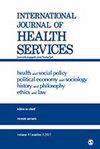2021 Climate and Health Review – Uncharted Territory: Extreme Weather Events and Morbidity
IF 3.4
4区 医学
Q1 HEALTH CARE SCIENCES & SERVICES
引用次数: 5
Abstract
Extreme weather events (EWEs) affected health in every world region during 2021, placing the planet in “uncharted territory.” Portraying the human impacts of EWEs is part of a health frame that suggests public knowledge of these risks will spur support for needed policy change. The health frame has gained traction since the Paris COP21 (United Nations Climate Change Conference) and arguably helped to achieve modest progress at the Glasgow COP26. However, reporting rarely covers the full picture of health impacts from EWEs, instead focusing on cost of damages, mortality, and displacement. This review summarizes data for 30 major EWEs of 2021 and, based on the epidemiological literature, discusses morbidity-related exposures for four hazards that marked the year: wildfire smoke; extreme cold and power outages; extreme, precipitation-related flooding; and drought. A very large likely burden of morbidity was found, with particularly widespread exposure to risk of respiratory outcomes (including interactions with COVID-19) and mental illnesses. There is need for a well-disseminated global annual report on EWE morbidity, including affected population estimates and evolving science. In this way, the public health frame may be harnessed to bolster evidence for the broader and promising frame of “urgency and agency” for climate change action.2021气候与健康评论-未知领域:极端天气事件和发病率
2021年期间,极端天气事件影响了世界每个区域的健康,使地球处于“未知领域”。描述环境有害生物对人类的影响是卫生框架的一部分,表明公众对这些风险的了解将刺激对所需政策变革的支持。自巴黎COP21(联合国气候变化会议)以来,卫生框架获得了牵引力,可以说有助于在格拉斯哥COP26上取得适度进展。然而,报告很少涵盖eewes对健康影响的全貌,而是侧重于损害成本、死亡率和流离失所。本综述总结了2021年30个主要ewe的数据,并根据流行病学文献,讨论了这一年的四种危害与发病率相关的暴露:野火烟雾;极度寒冷和停电;与降水有关的极端洪水;和干旱。发现了非常大的发病率负担,尤其广泛地暴露于呼吸系统后果(包括与COVID-19的相互作用)和精神疾病的风险中。需要一份广为传播的关于EWE发病率的全球年度报告,包括受影响人口的估计和不断发展的科学。这样,就可以利用公共卫生框架为更广泛和有希望的气候变化行动“紧迫性和机构性”框架提供证据。
本文章由计算机程序翻译,如有差异,请以英文原文为准。
求助全文
约1分钟内获得全文
求助全文
来源期刊
CiteScore
4.50
自引率
2.90%
发文量
41
审稿时长
>12 weeks
期刊介绍:
The International Journal of Health Services is a peer-reviewed journal that contains articles on health and social policy, political economy and sociology, history and philosophy, ethics and law in the areas of health and well-being. This journal is a member of the Committee on Publication Ethics (COPE).

 求助内容:
求助内容: 应助结果提醒方式:
应助结果提醒方式:


